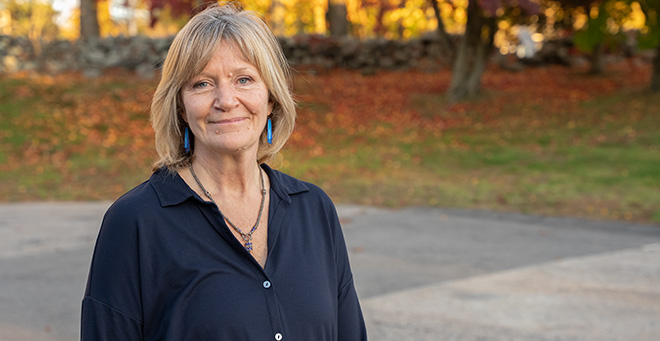
Maryann Davis, PhD, professor of psychiatry, is the principal investigator on a clinical trial underway studying the benefits of a peer intervention program for undergraduate students with serious mental health conditions and the measures needed to sustain their academic persistence. The trial is taking place on the Boston University and UMass Boston campuses.
Dr. Davis, who is also director of the Transitions to Adulthood Center for Research and the Implementation Science and Practice Advances Research Center at UMass Chan, said peer support coaches are working to help students develop or strengthen skill sets for academic success.
“It’s a professional relationship. It’s a coaching relationship. It’s different from mentoring. It’s very much an active relationship, identifying together goals the student wants to work toward,” Davis said. “The coaches are helping to stimulate [students’] thinking about what goals they could be working toward, and helping the students identify what might be getting in the way of things that they are wanting to achieve.”
Using the Peer Academic Supports for Success, or PASS, coaching model, the peer coaches meet with students every week or so, on average, over two semesters.
“For these students, not being able to address heightened stress with effective coping mechanisms can stimulate worsening symptoms. While PASS is not designed to deliver mental health treatment, it is designed to help them with coping and resiliency, that can essentially help their mental health stay stable,” said Davis.
Nearly 200 students are participating in the study, which launched in September 2020 and is in its final year of recruitment.
The Transitions to Adulthood Center for Research, in partnership with young adults with lived experience of college and mental health conditions, collaborated with Boston University and provided stakeholder input from an open trial conducted during the 2017-2018 academic year that examined the peer approach and confirmed the promise of PASS.
UMass Chan staff recruited the participants, conducted the interviews and summarized the findings from the open trial. The PASS coaching model was refined using those findings to address the needs of students with academically impairing mental health conditions. The model was developed by Paul Cherchia, LMHC, and Dori Hutchinson, ScD, at the Center for Psychiatric Rehabilitation at the Sargent College of Health and Rehabilitation Sciences at Boston University.
The current trial is funded through a $4.37 million grant from the National Institute on Disability and Rehabilitation Research. Cherchia and Dr. Hutchinson are co-investigators on the study, which will run through 2024.
Related UMass Chan news stories:
UMass Medical School improving employment prospects for youth with mental health disabilities
New grant to help teens with psychiatric disabilities become successful adults